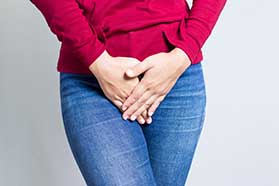Vaginal Yeast Infection Treatments in Indianapolis, IN

The human body is host to millions of microorganisms, including yeast and bacteria. Yeast is a microscopic species of fungus normally present in moist mucous membranes like the mouth, intestines or vagina. A vaginal yeast infection, or genital candidiasis, is one of the most common conditions diagnosed, affecting 3 out of every 4 women. It is caused when the delicate balance of yeast and bacteria in your vagina is disrupted and yeast begins to multiply. Yeast overgrowth is normally caused by a specific type of yeast, candida albicans, but any of 20 different candida organisms can be implicated in a vaginal yeast infection. The emergence of a strain of candida known as candida auris is of particular concern, since it is resistant even to the strongest antifungal drugs and can cause severe illness, especially in hospitalized individuals. U.S. healthcare providers have been alerted by the Centers for Disease Control and Prevention (CDC) to be on the lookout for this strain of candida in their patients.
Over 75 percent of women will be diagnosed with at least one vaginal yeast infection in their lifetime. A vaginal yeast infection can be triggered by a variety of factors including:
- Changes in acidity or hormonal balance of your vagina
- Diabetes or high blood sugar levels caused by excessive intake of sweetened foods or drinks
- Use of antibiotics, steroid medications or any substances that kill healthy bacteria in the body and cause an imbalance in the ratio of healthy bacteria to yeast
- Pregnancy
- Weakened immune system
- Poor diet
- Lack of sleep
- Stress
To schedule a consultation with a qualified healthcare practitioner in Indianapolis that specializes in vaginal yeast infection treatments, call (765) 259-0545 or contact Charles Turner MD online.
Vaginal Yeast Infection Symptoms & Diagnosis
Vaginal yeast infection symptoms usually present gradually and increase in intensity if left untreated. Common vaginal yeast infection symptoms include:
- Intense itching
- Burning
- Swelling
- Redness
- Thick whitish discharge (often characterized as looking like cottage cheese) that is usually odorless
- Rash
Less commonly, women can sometimes experience pain during sex or when urinating. Vaginal yeast infection symptoms can be similar to the symptoms associated with sexually-transmitted diseases (STDs) and other more serious vaginal infections, so it is important to see a healthcare provider for an accurate diagnosis.
If you are experiencing the symptoms mentioned above, a healthcare provider will likely test you for vaginal yeast infection by doing a pelvic exam and using a cotton swab to sample your vaginal discharge for the presence of candida overgrowth.
Vaginal Yeast Infection Treatment
Your healthcare provider can prescribe antifungal medication in the form of tablets, ointments and creams, or even vaginal suppositories. Single-dose antifungal tablets - like fluconazole, more commonly known as Diflucan - are a popular option. However, it is not safe for pregnant women and can cause birth defects. It is especially important for pregnant women to consult with a healthcare professional if experiencing vaginal yeast infection symptoms because not only certain medications but also the vaginal yeast infection itself may impact the fetus.
Over-the-counter antifungal creams are available and can be effective in either 1, 3 or 7-day treatment regimens. However, it is important to see your healthcare provider to ensure what you have is actually a vaginal yeast infection and not a more serious condition. This is especially important if you experience recurring yeast infections or your yeast infections do not resolve after using over-the-counter creams. Chronic vaginal yeast infections may require regular doses of strong antifungal medications for a period of weeks or months.
Some studies suggest 2 out of 3 women who purchase over-the-counter yeast infection creams do not have a vaginal yeast infection and instead are suffering from an STD, bacterial vaginosis or even a urinary tract infection, all of which can have serious complications if left untreated.
Using over-the-counter antifungal creams regularly when you do not have a vaginal yeast infection can create resistance to antifungal medications, much like overuse of antibiotics. Also, it is important to note that certain yeast infection medications may interfere with the effectiveness of birth control devices like diaphragms and condoms.
Your healthcare provider may recommend dietary changes, especially reduced intake of sugars and simple carbohydrates, as part of your treatment regimen. Probiotics are thought to be especially helpful for replenishing healthy bacteria and restoring the delicate balance of yeast and bacteria. A complete list of dietary recommendations and beneficial supplements can be provided to you by your healthcare provider.
If you are experiencing uncomfortable symptoms in your vagina and think you may have a vaginal yeast infection, a qualified women's health professional in Indianapolis can help resolve your issues with comprehensive vaginal yeast infection treatment! Call (765) 259-0545 or contact Charles Turner MD online.
Innovative Medicine
Address
3554 Promenade PkwySuite H
Lafayette, IN 47909
(765) 259-0545
www.innovativemedicine.org
Hours
Mon:
8:30 am - 5:00 pm
Tue:
8:30 am - 5:00 pm
Wed:
8:30 am - 5:00 pm
Thu:
8:30 am - 5:00 pm
Fri:
Closed
Sat:
Closed
Sun:
Closed
